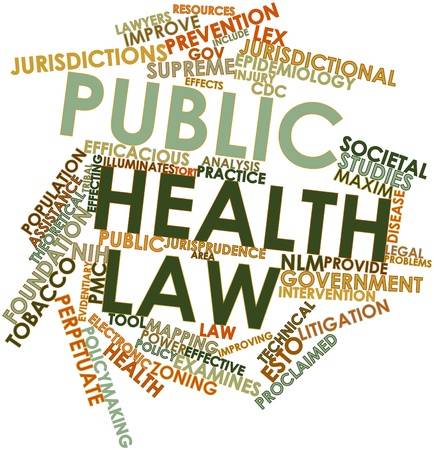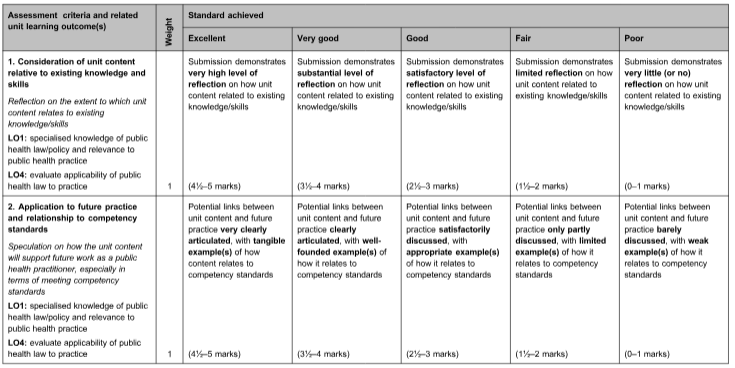Assessment Task 3: Practice reflection
Background
To complete the unit, a brief practice reflection task must be submitted. Students will reflect upon PUBH632 content in terms of: (a) how it relates to and extends their existing knowledge and skills; and (b) how they believe it will inform their future practice and support them in meeting relevant competency standards.
Assessment specifications : PUBH632 Public Health Law and Policy Assignment

Weighting : 10%
Length and/or format : 800 words
Purpose : To enable students to reflect upon their learning within the unit, and how it relates to competency standards for public health practice
Learning outcomes : 1 and 4
Submission : Turnitin (via the PUBH632 LEO page)
Feedback : Marks and feedback will be provided via LEO
Assessment criteria : See marking rubric below
Referencing : APA6
Instructions
Your practice reflection is an opportunity to reflect on PUBH632 as a whole, and consider how it relates to practice. “Relates to practice” should be thought of in two ways: (1) relates to your past practice and
existing knowledge/skills [marking criterion 1]; and (2) relates to your future career and practice, and the public health competency standards that underpin that [marking criterion2].
For the purposes of this unit, you should consider the Foundation Competencies for Master of Public Health Graduates in Australia, with a focus on the Health Policy, Planning and Management area of
practice (units of competency 10-13).
As in other units, the brief guide to reflective writing from Griffith University will assist in organising your
submission.
ORDER This PUBH632 Public Health Law and Policy Assignment NOW And Get Instant Discount
Referencing
APA6 is the required referencing style for this assessment task. Please ensure that you are familiar with the formatting and usage requirements for this style. Aside from the ACU Library materials provided, you may wish to use the Academic Referencing Tool from the La Trobe University Library.
Turnitin: Turnitin is a tool used to assist in the detection of referencing problems and/or plagiarism. Turnitin generates a similarity index for a document: that is, what percentage of the document contains material that is matched to accessible sources. Presence of similarity does not necessarily indicate plagiarism: there are many reasons why similar text is discovered in student documents.
Turnitin often classifies reference lists themselves as “similar”—this is similarity, but not plagiarism.
Marking rubric
In line with section 5.1 of ACU’s Assessment Policy, all assessment marking and grading must be criterion-referenced and use standards-based grading. Assessment criteria and standards are related
to unit learning outcomes. Student performance on a task is evaluated against each criterion, and according to the set standards of achievement for that criterion.
Assessment criteria and standards for this task are provided in the following rubric. Each criterion is marked according to a five-point standard, from “poor” to “excellent”, with a descriptor for each
standard. Within each standard there is a small marking range that further differentiates
Your final mark for the task reflects evaluation against all criteria.
Relevant PUBH632 learning outcomes: Assessment task 3
1. Demonstrate specialised knowledge of public health law and policy in terms of function, importance and relevance to public health practice (GA: 2, 5)
4. Evaluate the applicability and practical effects of public health legislative schemes to particular situations in public health practice, particularly those modifying the rights (or behaviours) of individuals (GA: 1, 2, 3, 8)




